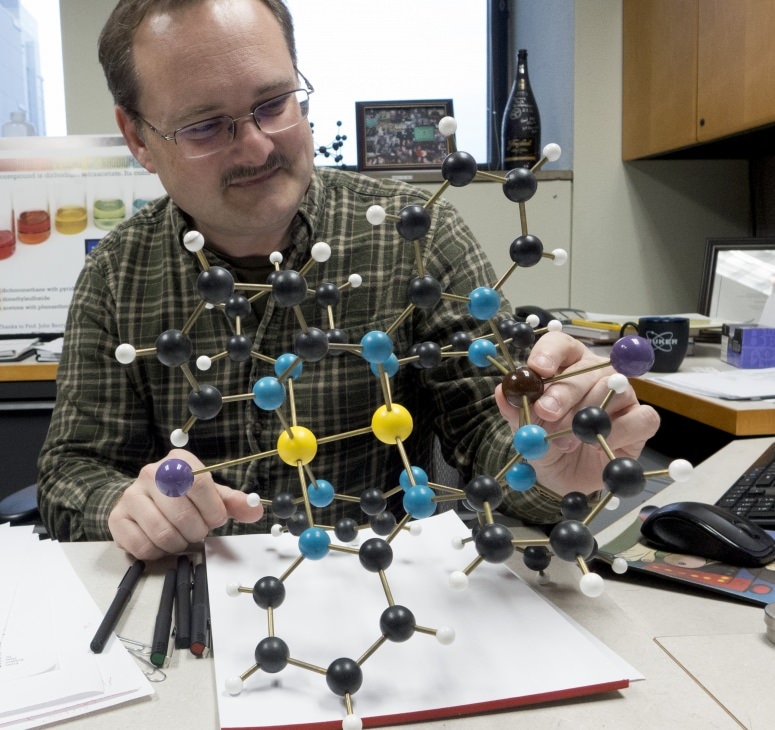Nov 14 2017
Recent work from John Berry’s lab at the University of Wisconsin–Madison suggests that electrons can be a persuasive bunch, or at least, a talkative bunch.
 Berry suggests that the new molecular magnet structure could be used in advanced computing, super-cold research, or further exploring the fundamentals of magnetism. DAVID TENENBAUM
Berry suggests that the new molecular magnet structure could be used in advanced computing, super-cold research, or further exploring the fundamentals of magnetism. DAVID TENENBAUM
The spins of unpaired electrons are considered to be the root of permanent magnetism, and after 10 years of design and re-design, Berry’s lab has developed a molecule that gains magnetic strength via a strange way of controlling those spins.
According to Berry, the new structure that graduate student Jill Chipman developed could lead to a revolution in quantum computing, an approach with such immense potential that it could destabilize the existing silicon-based supercomputers much as the telephone did to the telegraph: A huge leap forward that begins a slide into irrelevance.
The existence and activity, or “spin,” of unpaired electrons sets the strength of a permanent magnet, thus molecules with a greater degree of spin are considered to be a desirable target for chemists. The remarkably large spin in the new magnetic molecule, Berry explains, results from a “messenger electron” capable of shuttling between an unpaired electron at each end of the rod-shaped molecule and persuading all three of them to accept the same spin.
That agreement of spin, “orthogonality” in the jargon, enhances the strength of a permanent magnet.
Berry, a UW–Madison professor of chemistry, indicates that in other materials, a traveling electron tends to oppose the spins of magnetic centers, decreasing the magnetic strength. However, in Chipman’s new creation the messenger electron focuses on harmony: like a traveling social worker, it results in the two remote unpaired electrons to accept the same spin, adding durability and/or strength.
The new molecule, described in Chemistry – A European Journal, contains nickel, chlorine, nitrogen, carbon, and molybdenum, but fails to have the costly rare earth elements that have bedeviled efforts to commercialize new magnets that are super-strong. Its structure suggests that the molecule could be developed into a polymer – a repeating chain of units just like those found in plastics – raising the possibility of stronger, cheaper magnets.
“We tried to remove electrons from this molecule 10 years ago so it had an unpaired electron at each end, but did not get far,” Berry says. “We since learned that this made a chemical that is really temperature-sensitive, so Jill had to develop a low-temperature process that relies on dry ice to cool it to -78 degrees C.”
The “traveling social worker” electron establishes “a design principle that could be used to create many new magnetic molecules that behave as little bar magnets,” Berry says.
The discovery was also brought about by the arrival, last summer, of an instrument known as a SQUID magnetometer (Superconducting QUantum Interference Device) capable of measuring magnetism with excessive accuracy down to below two degrees above absolute zero.
Much of the focus of magnet innovation deals with greater strength.
There are all sorts of things people look for. We need both permanent magnets and those with ephemeral magnetization for different technical reasons. Magnets are widespread in ultra-cold refrigeration, motors, computer hard drives and electronic circuits.
John Berry, UW–Madison professor of chemistry
According to Berry, moving to the next step, and miniaturizing magnets to a single molecule, could enable quantum computing. Quantum computing could be specifically beneficial to chemists, who challenge staggering complexity in trying to model the chemical reactions that are considered to be their bread and butter.
This work was partially supported by the National Science Foundation (CHE-1669994). The NSF under Grant CHE-0840494 supported computational facilities. The Bruker Impact™ II mass spectrometer was funded through a bequest from Paul J. and Margaret M. Bender.